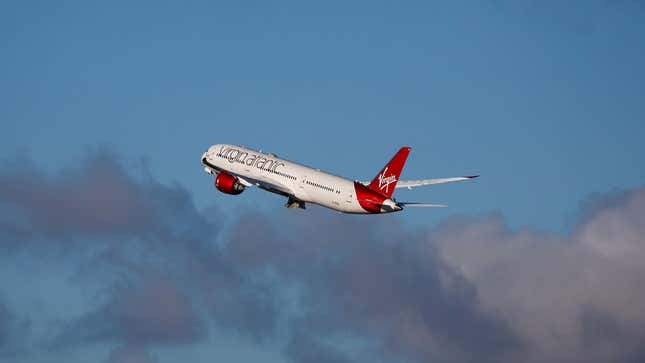
Virgin Atlantic has landed the world’s first long-haul flight of a passenger plane powered entirely by alternative fuel. The Boeing 787, which took off from London’s Heathrow Airport and landed at New York’s John F. Kennedy Airport, ran on so-called sustainable aviation fuel (SAF). Made from a blend of sources, including crops, household waste, and cooking oil, SAF could pave the way for more flights that don’t use fossil fuels.
The one-off flight didn’t carry any fare-paying passengers.
Planes still emit greenhouse gases when using SAF, but it releases 50% to 80% less carbon than standard petroleum-based jet fuel. Just one problem: there isn’t enough SAF to supply the world’s airlines. So the fuel is more expensive, which means ticket prices would end up being higher. Virgin founder Richard Branson told the BBC that it’s “going to take a while” before there’s enough SAF for everyone to use.
The UK government plans to require that 10% of aviation fuel is SAF by 2030. For its part, the International Airport Trade Association has said it’s committed to achieving “net zero” by 2050.
How does the airline industry aim to meet “net zero” goals?
Some airlines have been working with their largest business travel customers to design a system called “SAF certificates,” which lets companies pay to offset the carbon emissions generated by their employees’ travel. Airlines then use the money made from selling those certificates to buy a certain amount of SAF instead of traditional jet fuel, reducing their emissions.
In 2021, companies including Boston Consulting Group, Nike, and Hewlett-Packard bought enough SAF certificates to subsidize about 0.1% of United Airlines’ fuel consumption that year.
SAF is currently used in less than 0.1% of the aviation fuel consumed worldwide, and aircraft are usually only allowed to use up to 50% in a blend.
Some critics say that SAF isn’t a sustainable way to produce fuel because there aren’t enough feedstocks to meet airlines’ fuel requirements. And even if carriers replaced jet fuel entirely with SAF, their emissions reductions would max out at 80%. To further shrink their carbon footprint, airlines would also have to take steps like replacing their existing jet-fuel fleets with new models that can run on electric batteries.
Editor’s note: This story has been updated to reflect the flight’s successful landing at JFK.